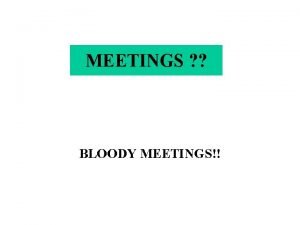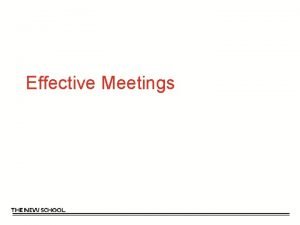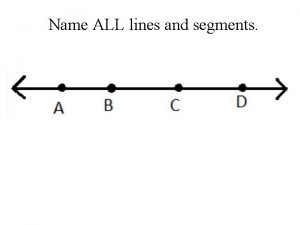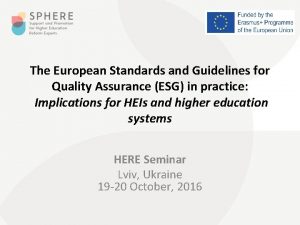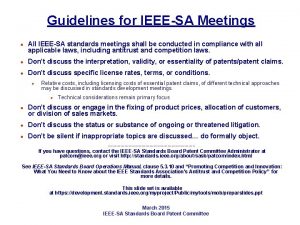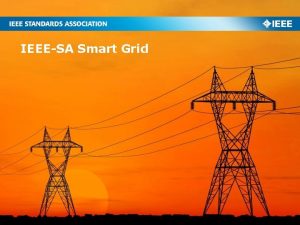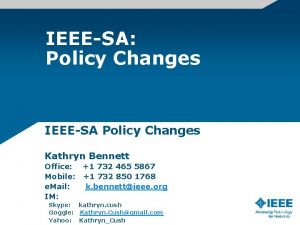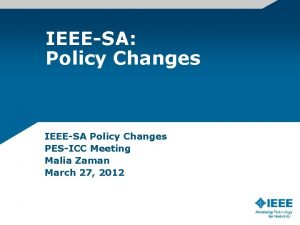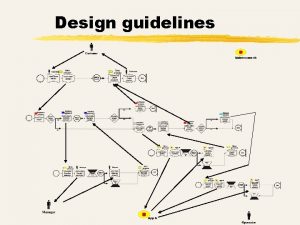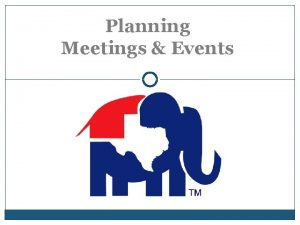Guidelines for IEEESA Meetings All IEEESA standards meetings







- Slides: 7

Guidelines for IEEE-SA Meetings • All IEEE-SA standards meetings shall be conducted in compliance with all applicable laws, including antitrust and competition laws. • Don’t discuss the interpretation, validity, or essentiality of patents/patent claims. • Don’t discuss specific license rates, terms, or conditions. • Relative costs of different technical approaches that include relative costs of patent licensing terms may be discussed in standards development meetings. • Technical considerations remain the primary focus • Don’t discuss or engage in the fixing of product prices, allocation of customers, or division of sales markets. • • Don’t discuss the status or substance of ongoing or threatened litigation. Don’t be silent if inappropriate topics are discussed … do formally object. -------------------------------- For more details, see IEEE-SA Standards Board Operations Manual, clause 5. 3. 10 and Antitrust and Competition Policy: What You Need to Know at http: //standards. ieee. org/develop/policies/antitrust. pdf If you have questions, contact the IEEE-SA Standards Board Patent Committee Administrator at patcom@ieee. org 02 January 2018 Page 1

At the beginning of each standards development meeting the chair or a designee is to: §Show the following slides (or provide them beforehand) §Advise the standards development group participants that: §IEEE SA’s copyright policy is described in Clause 7 of the IEEE SA Standards Board Bylaws and Clause 6. 1 of the IEEE SA Standards Board Operations Manual; §Any material submitted during standards development, whether verbal, recorded, or in written form, is a Contribution and shall comply with the IEEE SA Copyright Policy; §Instruct the Secretary to record in the minutes of the relevant meeting: §That the foregoing information was provided and that the copyright slides were shown (or provided beforehand). 2 Page 2

IEEE SA COPYRIGHT POLICY By participating in this activity, you agree to comply with the IEEE Code of Ethics, all applicable laws, and all IEEE policies and procedures including, but not limited to, the IEEE SA Copyright Policy. §Previously Published material (copyright assertion indicated) shall not be presented/submitted to the Working Group nor incorporated into a Working Group draft unless permission is granted. §Prior to presentation or submission, you shall notify the Working Group Chair of previously Published material and should assist the Chair in obtaining copyright permission acceptable to IEEE SA. §For material that is not previously Published, IEEE is automatically granted a license to use any material that is presented or submitted. 3 Page 3

IEEE SA COPYRIGHT POLICY §The IEEE SA Copyright Policy is described in the IEEE SA Standards Board Bylaws and IEEE SA Standards Board Operations Manual � IEEE SA Copyright Policy, see Clause 7 of the IEEE SA Standards Board Bylaws https: //standards. ieee. org/about/policies/bylaws/sect 6 -7. html#7 Clause 6. 1 of the IEEE SA Standards Board Operations Manual https: //standards. ieee. org/about/policies/opman/sect 6. html §IEEE SA Copyright Permission � https: //standards. ieee. org/content/dam/ieee-standards/web/documents/other/permissionltrs. zip §IEEE SA Copyright FAQs � http: //standards. ieee. org/faqs/copyrights. html/ §IEEE SA Best Practices for IEEE Standards Development � http: //standards. ieee. org/develop/policies/best_practices_for_ieee_standards_development_051215. pdf §Distribution of Draft Standards (see 6. 1. 3 of the SASB Operations Manual) � https: //standards. ieee. org/about/policies/opman/sect 6. html 4 Page 4

Participant behavior in IEEE-SA activities is guided by the IEEE Codes of Ethics & Conduct • All participants in IEEE-SA activities are expected to adhere to the core principles underlying the: – IEEE Code of Ethics – IEEE Code of Conduct • The core principles of the IEEE Codes of Ethics & Conduct are to: – Uphold the highest standards of integrity, responsible behavior, and ethical and professional conduct – Treat people fairly and with respect, to not engage in harassment, discrimination, or retaliation, and to protect people's privacy. – Avoid injuring others, their property, reputation, or employment by false or malicious action • The most recent versions of these Codes are available at http: //www. ieee. org/about/corporate/governance Approved by SASB in June 2019 Slide 1 Page 5

Participants in the IEEE-SA “individual process” shall act independently of others, including employers • The IEEE-SA Standards Board Bylaws require that “participants in the IEEE standards development individual process shall act based on their qualifications and experience” • This means participants: – Shall act & vote based on their personal & independent opinions derived from their expertise, knowledge, and qualifications – Shall not act or vote based on any obligation to or any direction from any other person or organization, including an employer or client, regardless of any external commitments, agreements, contracts, or orders – Shall not direct the actions or votes of other participants or retaliate against other participants for fulfilling their responsibility to act & vote based on their personal & independently developed opinions • By participating in standards activities using the “individual process”, you are deemed to accept these requirements; if you are unable to satisfy these requirements then you shall immediately cease any participation Approved by SASB in June 2019 Slide 2 Page 6

IEEE-SA standards activities shall allow the fair & equitable consideration of all viewpoints • The IEEE-SA Standards Board Bylaws (clause 5. 2. 1. 3) specifies that “the standards development process shall not be dominated by any single interest category, individual, or organization” – This means no participant may exercise “authority, leadership, or influence by reason of superior leverage, strength, or representation to the exclusion of fair and equitable consideration of other viewpoints” or “to hinder the progress of the standards development activity” • This rule applies equally to those participating in a standards development project and to that project’s leadership group • Any person who reasonably suspects that dominance is occurring in a standards development project is encouraged to bring the issue to the attention of the Standards Committee or the project’s IEEE-SA Program Manager Approved by SASB in June 2019 Slide 3 Page 7

